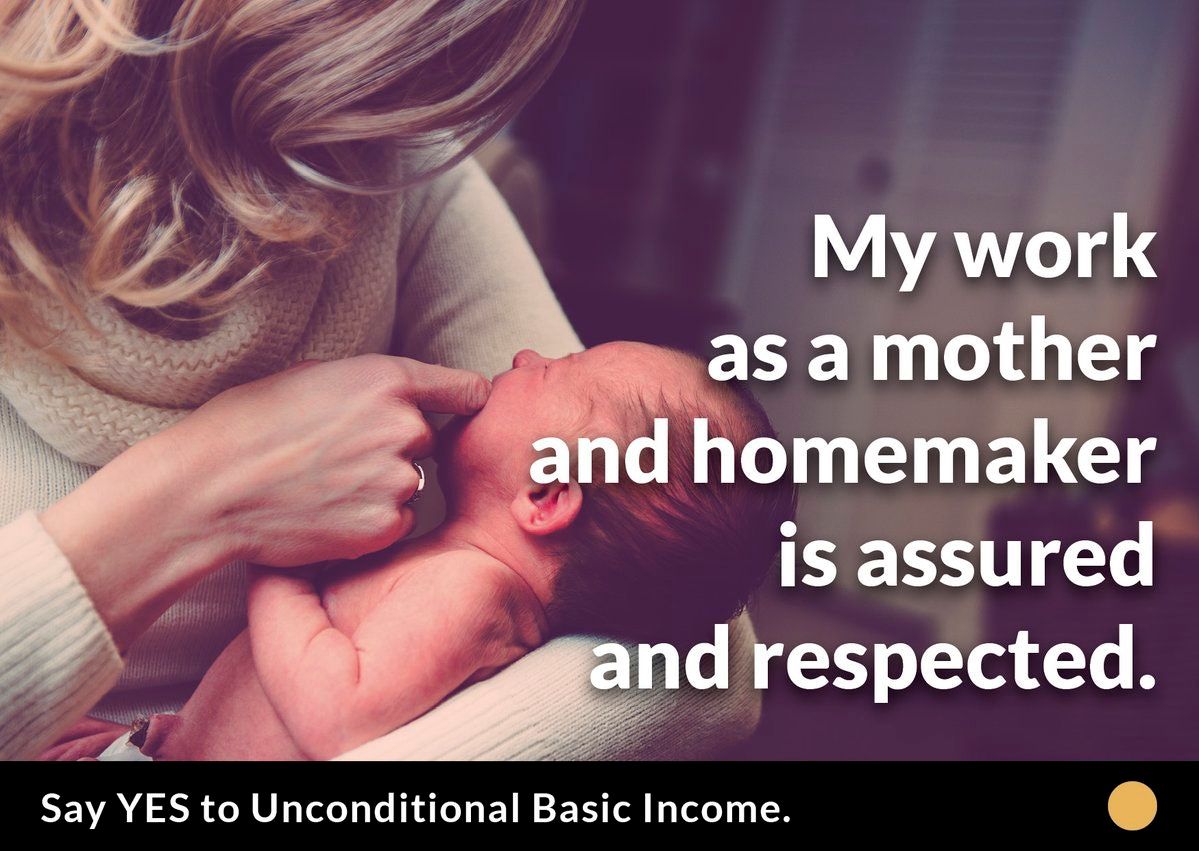A Pandemic is a Great Time to Stop Ignoring Unpaid Care Work

Care work is work. We need to recognize it and support it with monthly income.
Unpaid care work is work. I want to make that clear first and foremost. However, it’s also more than that. It’s a kind of work that can’t really be measured like wage work. It’s not like informal care workers clock in, work, take a break, work, clock out for lunch, clock in again, work some more, take a break, and clock out until the next day. Care work can be omnipresent.
Care work can be done even when nothing is actively being done. It’s kind of like being on call. Sometimes other work can be done while on call, while other times it can’t. You just have to be available at any moment, and because of that, often other work just can’t be done at all. Sometimes the care is of such high priority that no other work can even be thought about, let alone attempted. Sometimes after the work is actually over, at least temporarily, there can simply be no energy left in the batteries, despite one’s time being technically available for other work. A few hours of care work can be absolutely draining in a way other work isn’t. Care work can be absolutely exhausting work, physically and emotionally.
As an unconditional basic income advocate I’ve long appreciated the importance of care work and the argument for UBI as the only policy that can truly recognize and support all forms of care work, but only recently have I experienced care work to the degree I just have in my own life. My fiancee recently required a 10-day stay in the hospital. Every day I spent the day in her room beside her. My presence was part of her care, and if she needed little things like more water or a light flipped on or off, or something tossed in the garbage, or just a hug, I was there. I didn’t even bother bringing my laptop along, because why would I do that? For one, how am I supposed to write anything while the love of my life is in pain next to me? And two, it’s really difficult to write when I’m frequently being asked to do this or that, so the work I’d usually do wasn’t possible anyway, even if I’d wanted to do it in such an environment.
I feel incredibly fortunate that I was able to drop everything and just focus on my partner’s health. I was able to do that because I have a crowdfunded basic income. I didn’t need to use any paid leave days. I didn’t need to talk to Human Resources or prepare the receipts to file for some pandemic-related tax credit. I didn’t need to worry about losing my job if I was gone for too long. I just switched the work I was doing to something I felt was more important.
I’m not alone in that switch. That kind of switch has always happened. People have always stopped doing paid work in order to start doing unpaid work, sometimes temporarily and sometimes permanently, but that switch just happened in a very big way in 2020. Over 2 million women in the US have exited the labor force since the pandemic hit, many to focus on unpaid care work at home. They aren’t unemployed and seeking employment. They are not seeking employment. They are instead working at home, in an extremely undervalued economically kind of way. Men are switching to unpaid care work too, but unpaid work has always been disproportionately done by women, and that has only increased as a result of the coronavirus pandemic.
According to a UW study done in 2015, one-third of the U.S. population were informal caregivers performing 1.2 billion hours of unpaid work every week. If that work were split among full-time paid caregivers, it would require 30.5 million of them. If that work were counted as part of GDP, it would make up about 4.3% of it. That was years ago. I don’t know what the numbers are now due to Covid with so many more people needing care and so many schools closed. Whatever the numbers now are, indisputably, they have grown, and yet where is the recognition?
Now President Biden, to his credit, is seeking to establish a monthly child allowance which would provide $250 a month per kid, with an extra $50/mo for kids age five and under. Mitt Romney has also proposed a similar plan, but with an extra $100/mo for kids under six that also includes $1,400 prior to birth. Both are certainly welcome, and are great starts to really starting to recognize the unpaid care work of raising kids, but child care on average in the U.S. costs $1,230 a month, and not all care work involves kids. A great deal of care work involves caring for dependent adults, especially seniors. Where is the monthly cash allowance for that? And even if we were to start paying all unpaid care workers $1,230 a month to support that work, does that make economic sense as a proper reflection of that work’s true value?
A full-page ad recently appeared in the New York Times as an open letter to President Biden encouraging him to launch a “Marshall Plan for Moms” that includes $2,400 a month for at-home mothers. This letter was organized by Girls Who Code founder and CEO Reshma Saujani and signed by celebrities like Amy Schumer and Eva Longoria. $2,400 a month is a number that seems more appropriate in recognition of the work being done at home, and the work that needed to be left behind in order to pursue it.
Consider for a moment that work being left behind. Consider a mom that was being paid $3,000 a month as a toll booth operator, instead choosing to be a stay-at-home mom and teacher when schools closed down. Should that job she left even exist at all? Is it right for her to receive $3,000 less per month to do something fundamentally more important? Is that loss of income good for the economy as a whole? Which kind of work is better for society? Toll booth operating that can be better performed by unfeeling machines? Or parenting that is better done by loving parents?
Doesn’t it make more sense to end the jobs that can be done by machines, but make sure people still have incomes to do the work that is best done by humans? Is it somehow a loss for feminism if a woman is performing care work at home instead of performing work that could be easily automated while someone else is paid to do the caring? Shouldn’t the focus be on making sure that women and men alike can freely choose whether to pursue unpaid work at home or paid work in the labor market by at least making sure unpaid work at home is an actual option for everyone, and that everyone can also afford things like childcare that enable employment as a real option?
If we are ever to truly properly value unpaid work, recognize the importance of it as a society, and support it in a way that everyone can choose to do it full-time, part-time, or in times of sudden temporary need for it, we need to build a floor for caring that’s always there, underneath all of our feet, at all times. What that amount needs to be is up for debate, but right now it’s zero dollars, and that amount is simply unacceptable.
$2,000 a month has become the rallying cry for the amount of relief/stimulus that we should be getting every month for the duration of the pandemic. This number has 65% support, which includes even a majority of Republicans. I think this in addition to a monthly child allowance is what needs to be pushed for, and I think if it’s actually won, we would finally start supporting all unpaid work in a way we’ve never done before.
If we choose to start supporting and enabling all unpaid care work, I think it will change the way we as a society define work, and how we value each other. The labor market is not the only way of contributing to society, and it’s about time we stop saying that, and start thanking and supporting all the contributing going on that makes so much of all the other contributing even possible.
We’re in a pandemic for heaven’s sake. Out of all times, it’s right now when we most need to make sure that all of us can care for each other and not be actively punished financially for doing so.
If you agree, please contact your reps and tell them. $2,000 a month. It’s long overdue.

Did you enjoy reading this? Please click the subscribe button and also consider making a monthly pledge in support of my daily advocacy of basic income for all.
_large.jpg)
UBI Guide Newsletter
Join the newsletter to receive the latest updates in your inbox.
